The Coming of Conan Re-Read: “Xuthal of the Dusk”
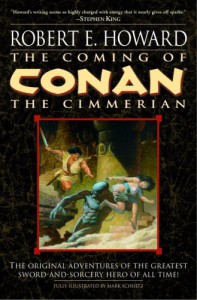 Bill Ward and I are reading our way through the Del Rey Robert E. Howard collection The Coming of Conan. This week we’re discussing “Xuthal of the Dusk,” sometimes known under the title “The Slithering Shadow.” We hope you’ll join in!
Bill Ward and I are reading our way through the Del Rey Robert E. Howard collection The Coming of Conan. This week we’re discussing “Xuthal of the Dusk,” sometimes known under the title “The Slithering Shadow.” We hope you’ll join in!
Howard: By this or its other name, “The Slithering Shadow,” Fritz Leiber once named this story as one of the weakest Conan yarns, describing it as “”repetitious and childish, a self-vitiating brew of pseudo-science, stage illusions, and the ‘genuine’ supernatural.”
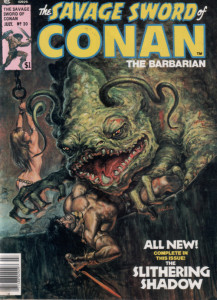 But then Leiber also wrote a number of Fafhrd and Gray Mouser stories that I never really cared for, so maybe it’s clear that I don’t always agree with him. Sure, “Xuthal” isn’t one of the great Conan stories, but I happen to think it’s one of the best of the lesser ones. For instance, I’d rather read this than “Teeth of Gwalhur,” “Iron Shadows in the Moon,” “The Pool of the Black One” or “The Veil of Lost Women.”
But then Leiber also wrote a number of Fafhrd and Gray Mouser stories that I never really cared for, so maybe it’s clear that I don’t always agree with him. Sure, “Xuthal” isn’t one of the great Conan stories, but I happen to think it’s one of the best of the lesser ones. For instance, I’d rather read this than “Teeth of Gwalhur,” “Iron Shadows in the Moon,” “The Pool of the Black One” or “The Veil of Lost Women.”
Bill: It isn’t really a favorite of mine, but it does have some elements that I’d single out as really good, the description and combat with the Lovecraftian Thog being the prime example. The whole ‘dreaming city’ is a great idea for a setting as well, and I liked the bleakness of the beginning — Conan giving Natala the last drink of water while intending to kill her out of mercy.
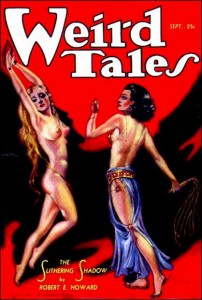 Howard: The weakest link in the story is Natala, who grates because she does little more than whine and worry. Her only redeeming qualities appear to be her natural assets, which makes me appreciate last week’s Olivia a little better. She also managed to get captured and whipped, because REH knew that would up his chances of getting the cover, either because of editor Farnsworth Wright’s preference or because of Wright’s belief that it would interest readers.
Howard: The weakest link in the story is Natala, who grates because she does little more than whine and worry. Her only redeeming qualities appear to be her natural assets, which makes me appreciate last week’s Olivia a little better. She also managed to get captured and whipped, because REH knew that would up his chances of getting the cover, either because of editor Farnsworth Wright’s preference or because of Wright’s belief that it would interest readers.
Bill: I’m not pulp scholar enough to really comprehend the whole need for “whips & tits” on the cover of magazines — but I’ve certainly seen plenty of examples from Weird Tales alone to get that it was part of the zeitgeist. Is it really the undercurrent of sado-masochism that appealed to readers, or is it more like a code image for prurient content of whatever kind? Is it possibly that, in an action story, one that can’t explicitly show sexual activity because of decency laws, having a woman bound and whipped is a way of having an action beat fill in for sex? I have no idea, really, but I’d be willing to bet any of these old stories would strike modern readers as incredibly tame compared to what’s implied in even a PG-13 raunchy comedy of today.
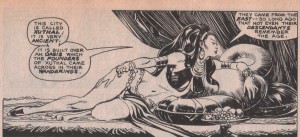 So for me the real detractor isn’t Natala, it’s Thalis. And it’s not so much Thalis’s instant attraction for Conan or rivalry with Natala, it’s the need to whip Natala’s dainty bottom as retaliation for a stab wound (!) while a man-eating god stalks the hidden passages of Xuthal. It just seems pretty stupid in a character that, up until that moment, didn’t seem stupid at all, or even zonked out like the rest of the native population of her adopted city. It feels shoehorned in, even if it does thematically reinforce the idea of decadence and sybaritism in Xuthal. I’d have zero problem with it if it made sense in the story, and I think REH could have come up with something better if he wasn’t chasing the flavor of the moment. Strangely, for me, the whipping feels juvenile, whereas horrible monsters and lost cities and the buckling of swashes never does.
So for me the real detractor isn’t Natala, it’s Thalis. And it’s not so much Thalis’s instant attraction for Conan or rivalry with Natala, it’s the need to whip Natala’s dainty bottom as retaliation for a stab wound (!) while a man-eating god stalks the hidden passages of Xuthal. It just seems pretty stupid in a character that, up until that moment, didn’t seem stupid at all, or even zonked out like the rest of the native population of her adopted city. It feels shoehorned in, even if it does thematically reinforce the idea of decadence and sybaritism in Xuthal. I’d have zero problem with it if it made sense in the story, and I think REH could have come up with something better if he wasn’t chasing the flavor of the moment. Strangely, for me, the whipping feels juvenile, whereas horrible monsters and lost cities and the buckling of swashes never does.
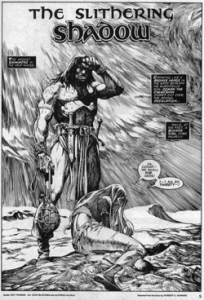 Howard: I’d never thought about Thalis like that, but you raise a good point. You could argue it’s an unnecessary moment, one purely designed to give us a damsel in distress and to show us that Thalis is absolutely no good.
Howard: I’d never thought about Thalis like that, but you raise a good point. You could argue it’s an unnecessary moment, one purely designed to give us a damsel in distress and to show us that Thalis is absolutely no good.
All that said, I think this story is a real blast of adventure right from the wonderfully evocative opening, which is so vivid that I’ve used it to illustrate descriptive prose in some of my writing classes. And Natala isn’t completely worthless — it’s she who gives Conan the waters of healing just before the story conclusion, and she even evokes a measure of unaccustomed feeling from Conan. I suppose she, and perhaps this story in its entirety, are one of the root causes of a whole score of sword-and-sorcery adventures where there’s a mostly naked chick and a grim hero and a deserted city with a weird menace. (Unless you count, you know, Greek myth.) Yet Robert E. Howard delivers even this modest plot far better than his imitators ever managed.
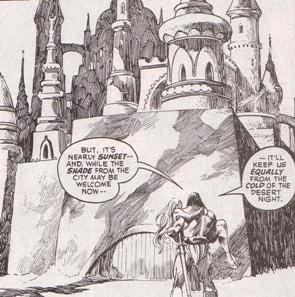 How about that fight with Thog? Man, that’s got to be one of the most brutal battles Conan ever engages in. Thog kicks his ass but Conan still doesn’t give up, or run screaming. I love how the fight shows us his capability when he cuts through a horde of soldiers in the scenes before. Howard did a fantastic job of juxtaposition here.
How about that fight with Thog? Man, that’s got to be one of the most brutal battles Conan ever engages in. Thog kicks his ass but Conan still doesn’t give up, or run screaming. I love how the fight shows us his capability when he cuts through a horde of soldiers in the scenes before. Howard did a fantastic job of juxtaposition here.
Bill: The Thog fight was one of the strongest elements, both in the writing and in the imaginative way REH makes Thog very otherworldly and weird. Another highlight for me was, again, how REH hits his civilization vs. barbarism theme throughout the story. Conan, in response to Thalis’ tale, responds that neither his people, or Natala’s, practice the kind of human sacrifice on display in Xuthal. Indeed, try that on a Cimmerian and you’ll get your head bashed in!
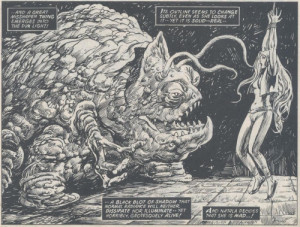 Howard: Absolutely. I don’t think I noticed, the first time I read these, how often Howard emphasized this. It’s more and more clear the more often I read them.
Howard: Absolutely. I don’t think I noticed, the first time I read these, how often Howard emphasized this. It’s more and more clear the more often I read them.
Bill: And Xuthal, ancient palace-city living out a long senescence, victim of its own amazing discoveries, its population prostrate before a vile god and wholly given over to dreams and pleasure, is decadent civilization writ large. It is a kind of prison, one peopled by individuals completely enslaved by their own amusements who would never seek to escape. It’s no accident that, in the final scene, it is “soft gold bars” that Conan removes with a “contemptuous wrench” in order to win his way to freedom — Xuthal itself is the same mix of wealth and weakness.
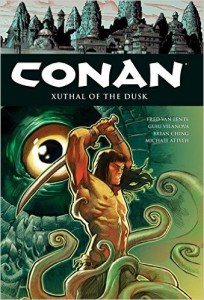 Howard: A nice summation. There’s all sorts of subtle creepy stuff going on throughout, too, although it’s perfectly possible to enjoy this just as a grand action tale. How about those terrible shrieks of Thalis as she’s carried off by Thog? What might they mean? The more you think about them, the more awful they become, feeding in again with what you said about the decadence of the city’s inhabitants. And there’s the aforementioned waters of healing, offered Conan by the woman who cares for him, symbolic of the value of love versus lust. There are a number of other little details as well.
Howard: A nice summation. There’s all sorts of subtle creepy stuff going on throughout, too, although it’s perfectly possible to enjoy this just as a grand action tale. How about those terrible shrieks of Thalis as she’s carried off by Thog? What might they mean? The more you think about them, the more awful they become, feeding in again with what you said about the decadence of the city’s inhabitants. And there’s the aforementioned waters of healing, offered Conan by the woman who cares for him, symbolic of the value of love versus lust. There are a number of other little details as well.
Bill: Natala healing Conan is a nice parallel with Conan giving her their last drink of water in the beginning, and I agree, there’s an implied sexual undercurrent to Thog’s menace which is very fitting for the god of Xuthal.
Howard: Sure, it’s not “The Tower of the Elephant” or even “Black Colossus” but then few sword-and-sorcery stories can stand on that elevated pedestal. I still prefer it to a number of other Conan tales. It’s short, atmospheric, crammed with mystery and action, and doesn’t overstay its welcome. It’s one I enjoy re-reading.
Join us next week for “The Pool of the Black One!”
8 Comments